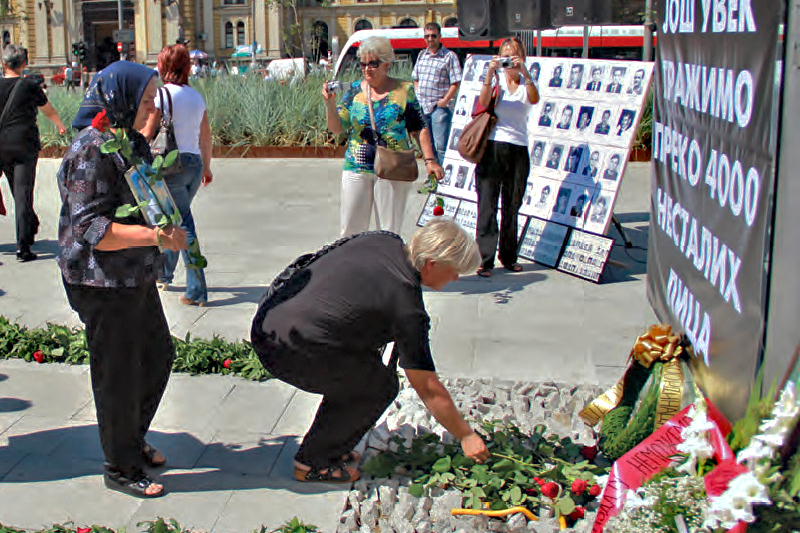
Families of people who went missing during the 1990s conflicts and have not been found marked the annual Day of the Disappeared by urging the authorities to do more to find their relatives’ bodies.
Events and ceremonies were held on Sunday and Monday in Serbia and Bosnia and Herzegovina to draw attention to the fact that around 10,000 people still missing from the Yugoslav wars, according to estimates by the International Committee of the Red Cross.
Serbian and Kosovo Albanian families whose relatives have been missing since the end of the Kosovo conflict in 1999 read out a joint letter at a conference in Belgrade on Monday addressed to the authorities in both Belgrade and Pristina, criticising them for failing to establish the whereabouts of around 1,650 people.
“We are convinced that the number of missing persons would be lower if officials in Belgrade and Pristina had the genuine political will to start dealing with this issue jointly,” the letter said.
Veljko Odalovic, the head of Serbian Commission for Missing Persons, told the conference that the biggest problem in finding those who are still unaccounted for is the lack of the information.
“We need precise, credible information from witnesses who will be able to come with us anywhere in Serbia so we can check together,” Odalovic said.
Matthew Holiday, the head of the International Commission on Missing Persons (ICMP) Western Balkans Programme, said that more than 40,000 people went missing as a result of the 1990s conflicts and that 70 per cent of them have been found and identified.
But another problem is the issue of misidentification due to the lack of precise methods used before DNA analysis was introduced, Holiday said.
“With no new secret graves being found, ICMP would call on the responsible institutions, the Serbian Commission on the Missing Persons, Kosovo Commission, EULEX [the EU rule-of-law mission in Kosovo] and the [EULEX] Department for Forensic Medicine to seriously address this issue of misidentifications,” he noted.
The previous day, missing persons associations and relatives of the missing gathered at the Belgrade Assembly to mark the International Day of the Disappeared, then walked to the nearby Tasmajdan Park and laid roses at the memorial dedicated to the Serb victims killed from 1991 to 2000 in the Yugoslav wars.
“We ask the authorities to resolve the destinies of the missing persons so that families can bury them, to punish those responsible and to provide assistance to the families of those killed,” said Dragan Pjevac, the president of Serbia’s Coalition for Missing Persons.
The International Day of the Disappeared was also marked across Bosnia and Herzegovina on Sunday, with ceremonies taking place in Sarajevo, Prijedor, Srebrenica, Bijeljina, Ozren and other cities. Families of missing persons used the day to call on the government to speed up the search for the remaining 8,000 people who have not been found since the 1992-95 conflict.
Bosnia’s human rights minister Semiha Borovac said that issue of missing persons was one of the toughest the county was facing.
“The ministry for human rights and refugees will try to prioritise the issue of missing persons and try to start activities which will solve the problems of families of missing persons,” said Borovac.
In central Sarajevo on Sunday, the International Commission on Missing Persons organised a presentation of sculptures with messages for the authorities like “Demand truth and justice” and “We are still looking for 8,000 citizens”. People also signed a petition which will be sent to the authorities to in a bid to encourage more support for the search for missing persons.
Amnesty International also issued a plea to the Bosnian authorities on Sunday, calling on them to finally start implementing the state-level law on missing persons which was adopted in 2004.
“This law demands that Bosnia and Herzegovina opens a fund to support families of missing persons, which is key for these families to achieve social and economic rights.
These families are often poor and in many cases they lost the head of the family,” Amnesty International said in a statement.
The president of the Women of Srebrenica association, Hatidza Mehmedovic, said at a ceremony in Srebrenica that was is important that the Day of the Disappeared was commemorated in “the place where genocide took place”.
“Everything went well and we sent out nice although sad messages. One of them is that Srebrenica should be a warning so that we build something safer and more just,” Mehmedovic told media.
Tuesday 1 September 2015
http://www.balkaninsight.com/en/article/serbia-bosnia-mark-missing-persons-day-08-31-2015

0 comments:
Post a Comment